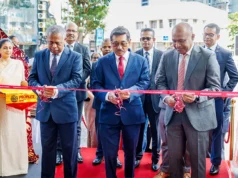Seneka Abeyratne
The interim budget speech, presented in parliament on August 30th, is eloquently written. It is easy to read and sprinkled with the right buzz words. It is crisp and flows like a meandering stream. But an interim budget speech should be a little more than a meandering stream. Though it possesses many positive features, what it lacks is a focal point, which could be articulated in the form of a question: “How do we resuscitate an ailing economy that is showing no signs of picking up?” The ADB’s GDP growth forecast for Sri Lanka in 2022 is a staggering -7.6 %. The private sector is the engine of growth.
As long as the engine remains in poor condition, the prospect of a strong economic recovery in this island will remain an elusive goal. The interim budget speech does not indicate how the government intends to breathe life into the crippled economy and stimulate rapid private-sector development, which is the key to attaining sustainable, catch-up growth. If the economy does not pick up soon, it is bad news for the country. Shortages of essential goods, including food, fuel and medicines, will worsen, inflation will continue to gallop like a racehorse, and the incidence of both absolute and relative poverty will reach obscenely high levels. A sense of urgency is missing in the interim budget speech.
The all-pervasive nature of the
economic crisis
The current economic crisis is so severe that it is threatening to transform the country into a basket case. How many businesses, including factories, shops, beauty parlors, and restaurants, have shut down during the past two years? How many workers have lost their jobs and fallen below the poverty line? How many families are suffering from extreme hunger and deprivation? How many outpatients and inpatients have died or are about to die due to the acute shortage of medicines? How much damage has the economic crisis inflicted on the educational sector? How many global business companies and financial institutions are staying away from Sri Lanka not only because it has committed the cardinal sin of going into debt default, but also because of its tepid business climate, its low global ranking in respect of business-friendly regulations, and its cavalier approach to macroeconomic policy formulation? What progress have the foreign lawyers and advisors hired by the government at prohibitive cost made to date in respect of negotiations pertaining to debt restructuring? What are the terms and conditions of the Staff-level Agreement reached by the IMF on an Extended Fund Facility (EFF) arrangement with Sri Lanka which even the parliamentarians have not yet seen? What proportion of the EFF of $ 2.9 billion will be diverted to the repayment of foreign loans obtained by the government from official lending agencies? How open and transparent is the government in the preparation of reform plans? How long will it take for the nation to emerge from the economic doldrums and learn to stand on its own two feet? The answer to all these questions is, “Heaven knows.”
The economy has been stuck in the emergency room for more than two years, rather like a bed-ridden patient who cannot survive without continuous blood transfusions. In this regard, a glaring omission in the interim budget speech is a section that outlines the core elements of an economic revival and stabilization strategy. Though the speech, by and large, is elegantly composed, there is no thread running through it that binds the narrative into a cohesive and consistent whole. The speech does make a serious attempt to dissect the true nature of the economic crisis or to enlighten the public about how it intends to extricate the economy from the mire of negative growth and stimulate sustainable, pro-poor growth. The narrative on the whole lacks depth due to the general absence of critical analysis and innovative thinking.
Will government fight corruption, nepotism and political patronage?
Be that as it may, the importance attached to some key areas of government policy intervention such as monetary and fiscal sector reforms, public sector reforms, restructuring of loss-making state-owned business enterprises, social welfare reforms, educational sector reforms, skills development, and the strengthening of macroeconomic fundamentals is a positive feature of the interim budget speech. To generate a primary surplus in the government budget by 2025 via higher revenues and lower expenditures is a notable goal, but to attain it, the government must make a serious attempt to eliminate corruption, nepotism, and political patronage. In this regard the sudden removal of the COPE Chairman, who was in the process of exposing the intimate link between political patronage and the current economic crisis, does not augur well for the future.
If the current administration continues with the abhorrent practice of replacing senior government officials who have no truck with corruption or political patronage with political stooges, it will be doing the country an immense disservice. Corrupt political stooges have wrecked the economy and will continue to wreak havoc in the nation as long as the deeply entrenched system of political patronage remains unchanged.
Private-sector must play key role
in economic revival
A central concern is whether the policy and regulatory reform agenda broadly identified in the speech is sufficient to stimulate rapid private-sector development and transform the nation from a high-cost producer of goods and services into a globally competitive economy. There is little or no mention in the interim budget speech of the critical need to address key constraints on private sector development and foreign direct investment inflows, given the current administration’s misguided notion that protectionism is the way out of the economic crisis.
Since the private sector (both local and foreign) must play a pivotal role in improving productivity, export performance, and global competitiveness, it follows that in the absence of a healthy business environment, the economy will continue to stagnate and government efforts to strengthen macroeconomic fundamentals will fail. If concrete measures are not introduced to create a salubrious ease-of-doing business climate, the economy is likely to remain in the doldrums.
In conclusion, as per the question: “Is the interim budget speech growth-oriented?” the answer is an emphatic, “No.”
The author is a retired economist/international consultant to ADB MANILA. He can be contacted at snabeyratne@gmail.com







